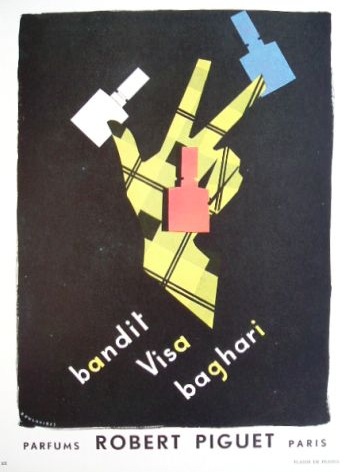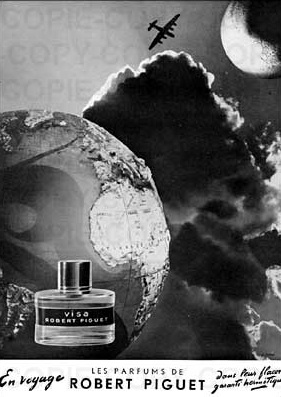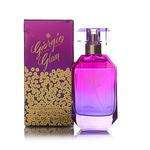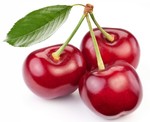Visa by Robert Piguet (2007) {Perfume Review} {New Fragrance/Advance Review}

Since the Robert Piguet label was bought by Fashion Fragrances and Cosmetics Ltd., the company has re-introduced several perfumes from the former Parisian couture house's catalog, including two of their most famous creations, Bandit and Fracas, which have enjoyed classical status in 20th century perfume history. If you like leather perfumes and chypres, you would have to be able to speak first-hand of the rubber-boot and ashtray nuances of Bandit, even if you do not personally appreciate the perfume or it does not agree with you. If you are partial to the scent of tuberose, you would have to seek out Fracas, and if not love it, at least be able to quote your classics.
Last year, a respectful, younger reformulation of Piguet Baghari was issued, which offered a retro charm while managing to smell contemporary at the same time. This time, Aurélien Guichard, the perfumer behind Bond No.9 Chinatown, Nina Ricci Love in Paris, Piguet Baghari and now Piguet Visa and Cravache in their 2007 updated versions, seems to have elected more fully to anchor the new perfume in the present. Visa (2007) smells quite modern and seems to have decided to eschew vintage references.......

Visa by Piguet, which was originally created circa 1945 (some sources also indicate 1946 and 1947), is classified sometimes as an aldehydic floral and at other times as a leather chypre. FFCL describes the new Visa as an oriental, which it is, with a pronounced fruity character and some aldehydic lift. I have not tested the original Visa (yet), but it appears rather clear that the new version is indebted to contemporary trends for its inspiration. It also makes room for Aurélien Guichard's personal interest in, it seems, producing an inspired peach-y accord as he did for Bond No.9 Chinatown. Developing to its fullest in the heart of the new Visa, the peachy-floral impression that unfolds for a while is a high point of the perfume.
The press release reminds new users of the original cosmopolitan travel theme for the perfume, reproducing an advertisement from 1947 (shown above) and explaining that,
A sophisticated woman travels the world but never gets lost in the crowd. Her signature fragrance is reminiscent of all the places she visits and sights she sees.
Visa (2007) can certainly evoke an orchard and a garden planted with fruits and flowers picked from different parts of the globe. It also plays intermittently in a more trite manner with a reference to Thierry Mugler Angel. Fortunately, as we said, it also brings in some of the personality of the perfumer through his work on a voluptuous peach accord, which seems to have gained in further delicacy since Chinatown. The peach here is also treated in an exotic manner, but less overtly so than in the spicy and original Bond No.9 Chinatown.
The first ten minutes of Visa's development are very mainstream, even surprisingly so. The perfume smells like a lighter version of Angel and in fact it smells almost exactly like the recent Estée Lauder Pleasures Delight, but done with less finesse. One is ready to dismiss the new Visa at this point as suffering from a case of acute banality and shortage of ideas. The scent however deepens as it evolves and takes on a new personality becoming more interesting. At this point I can only hypothecize that the conventional Angel introduction was a way to attract the mainstream group of customers to then lead them into less-traveled territory. Perhaps so and perhaps not. At any rate, more than anything else, the scent feels commercial in the beginning.
The next impression is dark (immortelle), fruity, peachy and plummy with, again, a beautiful peach accord that evolves subtly and delicately. Subtle nuances succeed to each others like soft clouds chasing each other on a balmy floral background with a rose and violet accord, with sugary, jam-y, even burnt sugar facets that make one think of the recent Putain des Palaces by Etat Libre d'Orange and La Môme by Balmain. Peachy fragrance aficionados will enjoy the finesse and depth of the accord.
The heart is so aesthetically pleasing and rich it makes one think of the refinement of a Japanese silk kimono decorated with peach fruits and plum blossoms. At other times, one thinks of the gourmand quality of a Turkish dessert consisting in slit dried apricots filled with clotted cream, except we are offered white vineyard peaches instead. There is a whisper of leather underneath the more dominant dark fruity impressions, which almost imperceptibly contributes to adding further depth and character to the new Visa.
In the first part of the dry-down, Angel resurfaces. As the scent develops overtime, it goes back to more original impressions.
The perfume smells very good and succeeds in conveying a sensual and feminine impression. The warmth of its glow is enjoyable.
In a sea of lite fruity-florals targeting young women who seem to have barely escaped from childhood to get re-plunged in it thanks to perfume developers, the new Visa is a good, more womanly type of fruity perfume for fall and winter. It is not as sophisticated as Guerlain Mitsouko and Rochas Femme but it is abstract and refined enough to be considered a gourmand and fruity oriental for more adult women (and men).
From FFCL:
Visa opens with lush notes of white vineyard peach, pear, violet leaves and Italian bergamot and yellow mandarin essences. Heart notes include rich ylang essence mingled with rose, immortelle and orange flower absolutes. Essence of Indonesian Patchouli and sandalwood, vetiver, moss, vanilla beans, benzoin and a gourmand leathery accord compose the drydown.
Visa de Robert Piguet will be available exclusively at
Le Bon Marche in Paris and at Harvey Nichols in London
Launch Date: October 2007
Parfum: 1.0 oz./30 mL
Eau de Parfum: 1.7 oz./50 mL; 3.4 oz./100 mL
(Images are from Vintage Fashion Publications and Okadi)










Hi, can anyone help me find a bottle of Jeunesse by Robert Piguet? It's apparently impossible, but I'd really love to find one. Thanks!